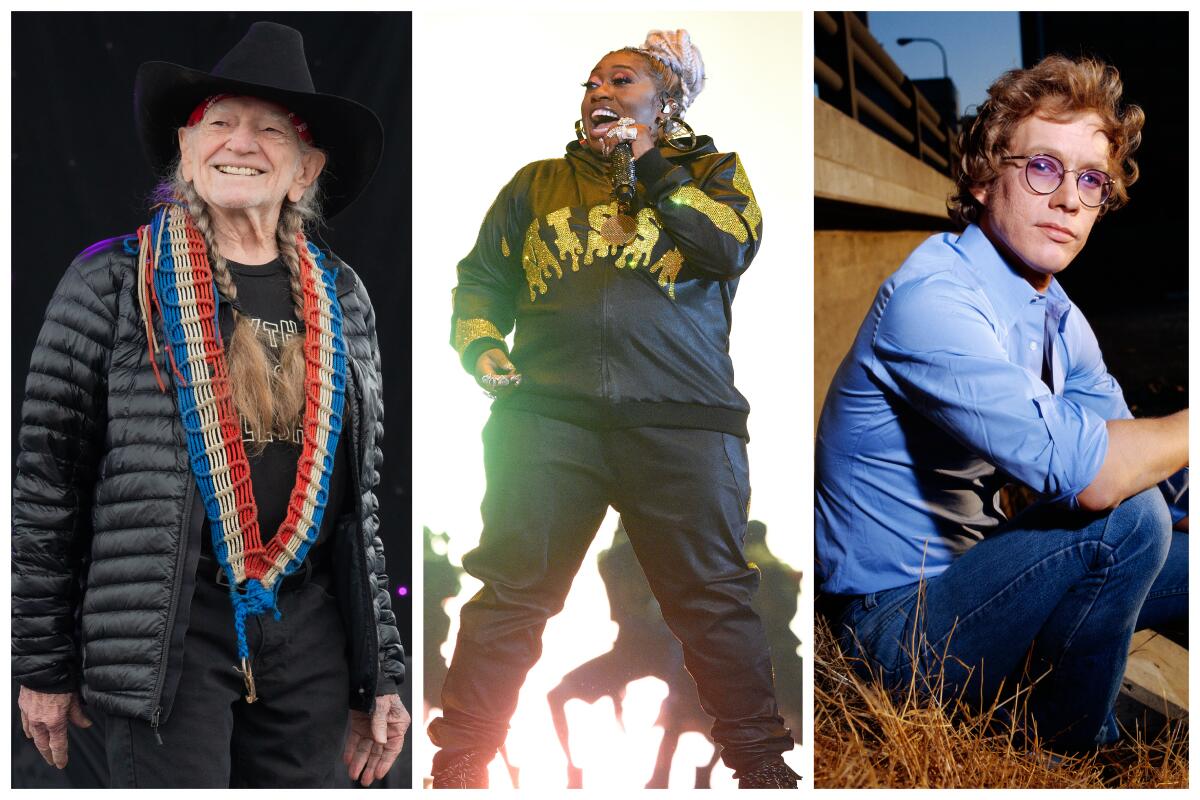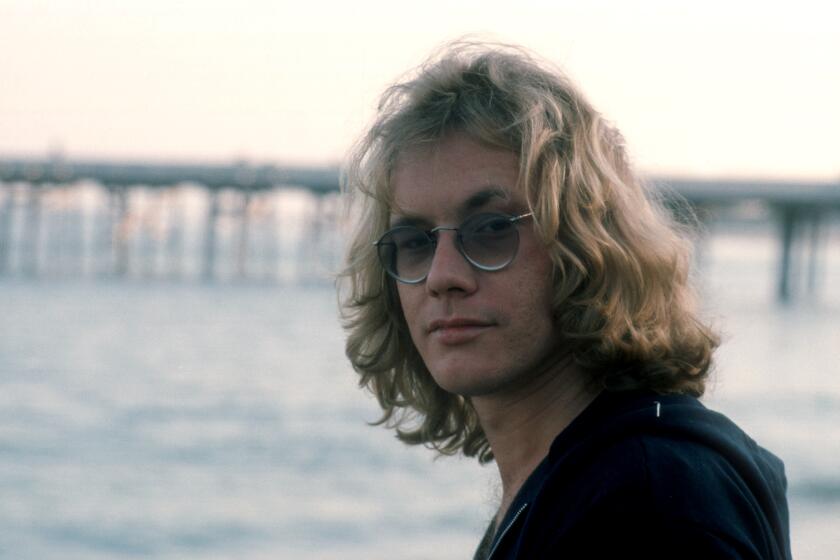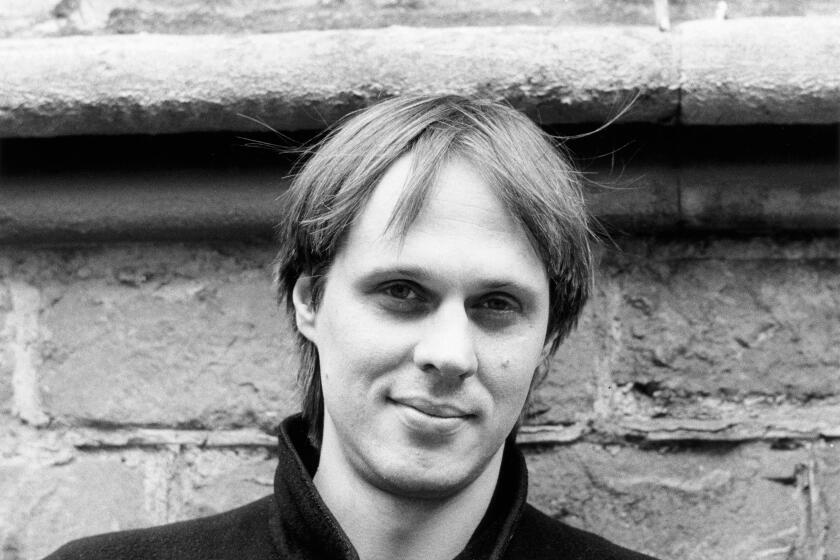Willie Nelson, Missy Elliott, Warren Zevon lead 2023 Rock Hall nominations

- Share via
Country icon Willie Nelson, hip-hop trailblazer Missy Elliott, pop superstar George Michael and indie-rock duo the White Stripes are among eight acts nominated for the first time for induction into the Rock & Roll Hall of Fame, the institution announced Wednesday.
They are joined on the ballot by first-time nominees Sheryl Crow, Cyndi Lauper, the late Warren Zevon and a combined entry for Joy Division and its spinoff, New Order. Also returning to the ballot are previous nominees Kate Bush, Iron Maiden, Rage Against the Machine, Soundgarden, the Spinners and A Tribe Called Quest.
“This remarkable list of nominees reflects the diverse artists and music that the Rock & Roll Hall of Fame honors and celebrates,” John Sykes, chairman of the Rock & Roll Hall of Fame Foundation, said in a statement. “These artists have created their own sounds that have impacted generations and influenced countless others that have followed in their footsteps.”
To be eligible, an artist or group must have released its first commercial recording at least 25 years prior to the nomination.
The singer-songwriter is a nominee for induction into the Rock & Roll Hall of Fame, as well as the subject of a tribute concert and a forthcoming documentary.
Critical consensus and popular taste were mostly in agreement about rock ‘n’ roll’s early years, as the originators of rock, blues and soul were inducted, but as the splintered music of the ’80s and ’90s replaced the baby-boomer canon of the ’60s and ’70s, arguments among voters, fans and music executives about who and what merits inclusion have increased.
In recent years, the Hall has openly sought to represent a big-tent definition of rock ‘n’ roll (as opposed to its more guitar-oriented offspring, rock) that encompasses the Sex Pistols and Tina Turner, Public Enemy and Jackson Browne, Brian Eno and Marvin Gaye. In 2016, Kiss singer-bassist Gene Simmons and Ice Cube got into a public tiff over whether N.W.A and hip-hop qualified to be in an institution for rock.
At the group’s induction that year, Cube responded: “Rock ‘n’ roll is not an instrument, rock ‘n’ roll is not even a style of music. Rock ‘n’ roll is a spirit.”
Hip-hop and Black artists in general have often felt underrepresented, and so too have heavy metal acts. Only 10 rap acts have been inducted in the Hall’s nearly four decades, including Eminem last year and Run-D.M.C. This year’s nomination of Elliott, a platinum-selling rapper and producer, also represents the growing presence of women on the annual ballot.
U.K. metal stalwarts Iron Maiden are also back on the ballot after first being nominated in 2022.
The nomination of Zevon, the gifted, sardonic and highly respected songwriter who died in 2003, follows some high-profile lobbying by Billy Joel and others and may represent one of the final entries into the Hall for his generation of artists.
Verlaine fronted the singular New York band Television, with whom he made two of rock’s most acclaimed albums.
The inclusion of Nelson, who has long mingled with rockers and co-founded the annual Farm Aid benefit with Neil Young and John Mellencamp, suggests the Rock Hall is actively expanding its purview to include hugely influential country icons, following last year’s induction of Dolly Parton. Nelson turns 90 on April 29.
Kate Bush is nominated for a fourth time, but in 2023 the context is different, as the singer has been rediscovered by a new generation of young listeners. Her “Running Up That Hill” became her first U.S. Top 10 hit nearly four decades after its original 1985 release when it was used in a key dramatic moment of the Netflix sensation “Stranger Things.”
The dual nomination of gloom punks Joy Division and their more dance-oriented offshoot New Order follows previous two-bands-in-one inductees the Small Faces/Faces and Parliament/Funkadelic. In these cases, the bands shared prominent band members, if not always the same musical missions. (U.K. mods the Small Faces, for example, evolved into the more rock-oriented Faces with the addition of singer Rod Stewart and guitarist Ronnie Wood in 1969.)
New Order rose from the ashes of Joy Division following the suicide of singer Ian Curtis in 1980. Joy Division’s post-punk doom showed the way for a thousand gothic pop acts to follow. Without Curtis, New Order followed its own path into forward-leaning dance music through hits such as “Blue Monday,” “Bizarre Love Triangle” and “Love Vigilantes.”
Final inductees will be announced in May, followed by a ceremony in the fall with a date and location still to be announced.
Last year’s ceremony was held at the Microsoft Theater in Los Angeles. Inductees and performers include Parton, Lionel Richie, Duran Duran and Eminem.
More to Read
The biggest entertainment stories
Get our big stories about Hollywood, film, television, music, arts, culture and more right in your inbox as soon as they publish.
You may occasionally receive promotional content from the Los Angeles Times.










